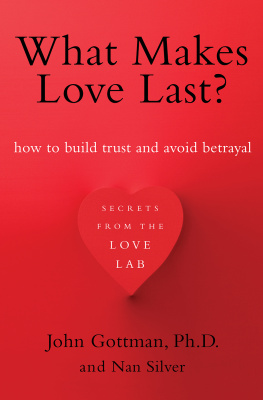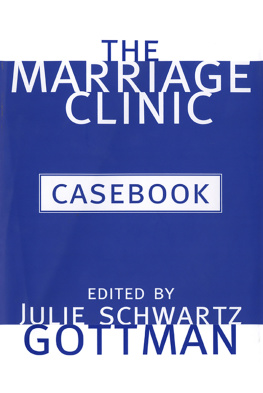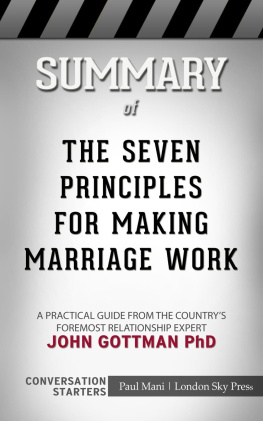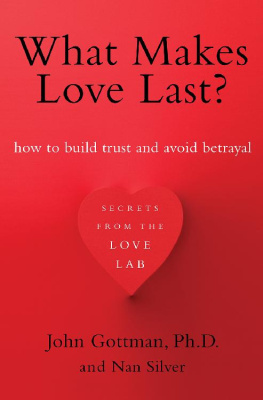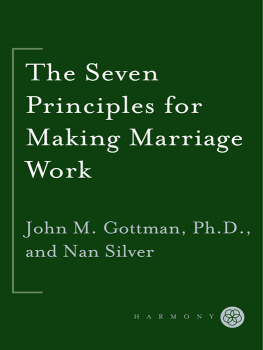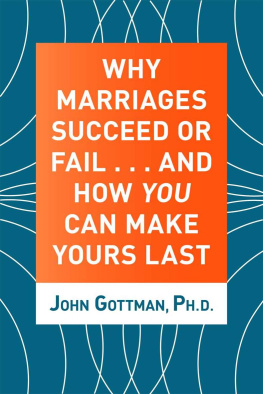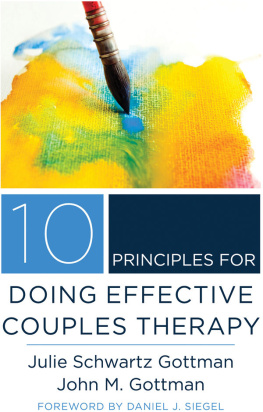John Gottman Ph.D. - The Seven Principles for Making Marriage Work
Here you can read online John Gottman Ph.D. - The Seven Principles for Making Marriage Work full text of the book (entire story) in english for free. Download pdf and epub, get meaning, cover and reviews about this ebook. City: New York, year: 2002, publisher: Crown Publishing Group, genre: Home and family. Description of the work, (preface) as well as reviews are available. Best literature library LitArk.com created for fans of good reading and offers a wide selection of genres:
Romance novel
Science fiction
Adventure
Detective
Science
History
Home and family
Prose
Art
Politics
Computer
Non-fiction
Religion
Business
Children
Humor
Choose a favorite category and find really read worthwhile books. Enjoy immersion in the world of imagination, feel the emotions of the characters or learn something new for yourself, make an fascinating discovery.

- Book:The Seven Principles for Making Marriage Work
- Author:
- Publisher:Crown Publishing Group
- Genre:
- Year:2002
- City:New York
- Rating:5 / 5
- Favourites:Add to favourites
- Your mark:
- 100
- 1
- 2
- 3
- 4
- 5
The Seven Principles for Making Marriage Work: summary, description and annotation
We offer to read an annotation, description, summary or preface (depends on what the author of the book "The Seven Principles for Making Marriage Work" wrote himself). If you haven't found the necessary information about the book — write in the comments, we will try to find it.
The Seven Principles for Making Marriage Work — read online for free the complete book (whole text) full work
Below is the text of the book, divided by pages. System saving the place of the last page read, allows you to conveniently read the book "The Seven Principles for Making Marriage Work" online for free, without having to search again every time where you left off. Put a bookmark, and you can go to the page where you finished reading at any time.
Font size:
Interval:
Bookmark:
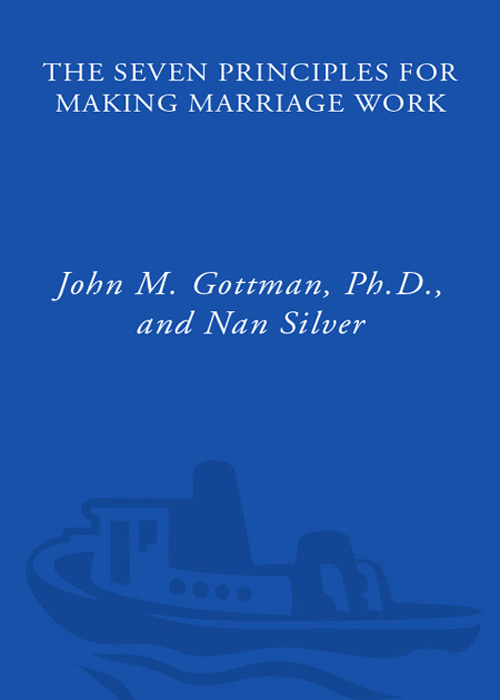
Acknowledgments
First and foremost, I need to acknowledge the brave gift that several thousand volunteer research couples have contributed to my understanding. Their willingness to reveal the most private aspects of their personal lives has opened a hitherto closed door that has made it possible to construct these Seven Principles for making marriages work.
This book was based on research that received continuous support from the National Institute of Mental Health, the Behavioral Science Research Branch. Of great assistance was the dedicated guidance of Molly Oliveri, Della Hahn, and Joy Schulterbrandt.
This book was also made possible by a number of important collaborations that have been a joyful part of my life. These include the main collaboration that has graced my life for the past nineteen years with Professor Robert Levenson of the University of California. Also important to me has been my collaboration with Neil Jacobson of the University of Washington and my work with Dr. Laura Carstensen of Stanford University.
I have been blessed with rich associations inside my laboratory. The cornerstones have been Sharon Fentiman, whose elegance greatly improves my life and keeps me from chaos; Dr. Sybil Carrere, who runs my lab and is a terrific colleague; and Cathryn Swanson, my programmer and data analyst. Not only are they friends and intellectual companions, but they help make coming to work a pleasant experience. I also wish to acknowledge the contributions and stimulation of Lynn Katz.
My wife, Julie Schwartz Gottman, provided love, friendship, motivation, intellectual camaraderie, support, and conceptual organization. She has also been my teacher and guide in practicing psychotherapy. She made doing the couples and parents workshops an exciting creative experience. While we are busy with our full-time jobs, Etana Dykan capably runs our Seattle Marital and Family Institute with great spirit and attention to detail, and she also helps facilitate our communication. Her amazingly creative brother, Shai Steinberg, has also been a tremendous asset in many areas of our work. Linda Wright helps us keep the couples enterprise very warm and humanshe is unusually gifted in talking to desperate couples. Peter Langsam has been our faithful consultant and partner throughout, helping us with wise counsel, elemental guidance, and business sense.
I have recently been blessed with excellent students and staff, including Kim Buehlman, Jim Coan, Melissa Hawkins, Carole Hooven, Vanessa Kahen, Lynn Katz, Michael Lorber, Kim McCoy, Janni Morford, Sonny Ruckstahl, Regina Rushe, Kimberly Ryan, Alyson Shapiro, Tim Stickle, and Beverly Wilson.
I need to acknowledge the intellectual heritage upon which I draw. As Newton once wrote, If I have seen further... it is by standing upon the shoulders of giants. For me these shoulders include the work of Les Greenberg and Susan Johnson on emotionally focused marital therapy; Bob Weisss scholarly work on many concepts, including sentiment overrides; Cliff Notariuss work on many concepts, including couple efficacy; Howard Markmans faith in preventive intervention; Dick Stuarts great contributions, including his approach to behavior exchange; Jerry Lewiss work focusing on the balance of autonomy and connectedness in marriage; and the persistent work of my colleague Neil Jacobson, who is the gold standard for marital therapy research. I am also indebted to Jacobsons recent work with Andy Christensen, on acceptance in marital therapy. I also wish to acknowledge the contributions of Peggy Papp and Pepper Schwartz and their feminist approach to gender differences and egalitarian marriage, as well as the work of Ronald Levant and Alan Booth on men in families.
I must also mention Dan Wiles work on marital therapy, with its superb focus on process. I love Wiles writing and thinking. They are entirely consistent with many of my research findings. I think that Wile is a genius and the greatest living marital therapist. I am blessed to have been able to exchange ideas with him.
I wish to acknowledge the work of Irvin Yalom and Victor Frankl on existential psychotherapy. Yalom has provided a great faith in the therapeutic process itself and in the human force toward growth. Frankl holds a special place in my heart. He and my beloved cousin Kurt Ladner were both residents and survivors of the Dachau concentration camp. Both found meaning in the context of intense suffering, tyranny, and dehumanization. I hope to bring their existential search for meaning into the marital context. Doing so can turn conflict into a new experience of revealing and honoring life dreams, finding shared meaning, and reaffirming the marital friendship.
I have come to the conclusion that many insightful writers in the marital field are basically correct. I hope my contribution will be to honor them all, adding a bit of precision and integration to the struggle to understand what makes close relationships work.
J.G.
Also by John Gottman
Meta-Emotion:
How Families Communicate Emotionally
with Lynn Katz and Carole Hooven
The Heart of Parenting:
How to Raise an Emotionally Intelligent Child
with Joan DeClaire
The Analysis of Change
Why Marriages Succeed or Fail
with Nan Silver
What Predicts Divorce?
Afterword: What Now?
N o book (or therapist) can solve all of your marital problems. But by incorporating these Seven Principles into your marriage, you really can change the course of your relationship. Even making just a small and gentle change in the trajectory of your marriage can have a dramatic, positive effect over time. The catch, of course, is that you have to build on the change and keep it going. Improving your marriage is a kind of journey. Like all journeys it begins by suspending disbelief, taking one small step, and then seeing where you are and taking the next step. If you get stuck or take a few missteps, reread portions of this book with an eye toward charting where your marriage is now. Then youll be able to figure how to help it along in the right direction.
Once you feel your marriage is on course, here are some ideas to help you maintain momentum.
T H E M AGIC F IVE H OURS
When we followed up on couples who attended our Seattle workshops, we wondered what would distinguish those couples whose marriages continued to improve from those whose marriages did not. Would we find that the successful group had dramatically overhauled their lives? Far from it. To our surprise, we discovered that they were devoting only an extra five hours a week to their marriage. Although each couple had their own style of spending these extra five hours, some clear patterns emerged. In general, what these couples were doing was giving their marriage a concentrated refresher course in the Seven Principles. The approach works so phenomenally well that Ive come to call it the Magic Five Hours. Heres how you can do it, too:
Partings. Make sure that before you say good-bye in the morning youve learned about one thing that is happening in your spouses life that dayfrom lunch with the boss to a doctors appointment to a scheduled phone call with an old friend.
Time: 2 minutes a day 5 working days
Total: 10 minutes
Reunions. Be sure to engage in a stress-reducing conversation at the end of each workday (see page 87).
Time: 20 minutes a day 5 days
Total: 1 hour 40 minutes
Admiration and appreciation. Find some way every day to communicate genuine affection and appreciation toward your spouse.
Next pageFont size:
Interval:
Bookmark:
Similar books «The Seven Principles for Making Marriage Work»
Look at similar books to The Seven Principles for Making Marriage Work. We have selected literature similar in name and meaning in the hope of providing readers with more options to find new, interesting, not yet read works.
Discussion, reviews of the book The Seven Principles for Making Marriage Work and just readers' own opinions. Leave your comments, write what you think about the work, its meaning or the main characters. Specify what exactly you liked and what you didn't like, and why you think so.

